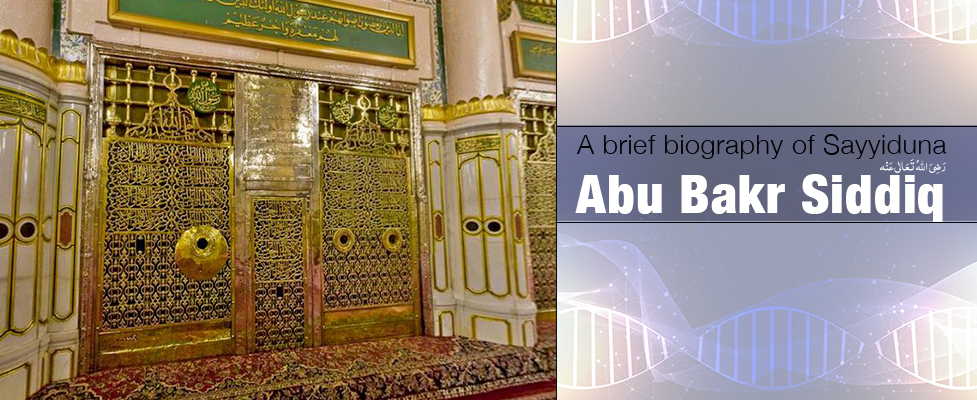A Brief Biography of Sayyiduna Hazrat Abu Bakr Siddiq
March 06,2018 - Published 6 years ago

Hazrat Abu Bakr Siddiq رَضِیَ اللہُ تَعَالٰی عَنْہُ, whose real name was Abdullaah. He was the son of Abu Qahafah, whose real name was Usman. His lineage was therefore Abdullaah bin Usman bin Aamir and he belonged to the Quraysh tribe of Makkah. He was amongst the vanguards of Islam, was one of the Khulafaa-e-Rashideen as well as amongst the Asharah Mubashara. He was the first man to accept Islam and gave everything he had for the sake of Islam. Allah عزوجل blessed him to Protect Rasulullaah صَلَّی اللہُ تَعَالٰی عَلَیْہِ وَاٰلِہٖ وَسَلَّمَ, to propagate the Islam and also blessed him with an exceptional level of Imaan and love for Allah عزوجل. He was the sword of the Muslims in the struggle against the Munafiqen and enemies of Islam.
Hazrat Abu Bakr Siddiq رَضِیَ اللہُ تَعَالٰی عَنْہُ was born two and a half years after the Year of the Elephants. From his youth, he was far distanced from the oppression and filth that is associated with the period of Ignorance, while being imbued with all the praiseworthy traits of the Arabs of the time. His character and behaviour was always exemplary and even before Islam, he forbade liquor for himself. He was an authority on Arab lineages and knew all the Arab families and tribes. He was always assisting the poor and the weak and earned the respect of the rich and powerful as well.
The Arabs referred their disputes to him and accepted all the judgments he passed. He therefore enjoyed much acclaim and respect and occupied a high position in society. He was an experienced and astute businessman and also an expert in the interpretation of dreams. His untainted reputation and honour together with his unquestionable intelligence and farsightedness all complemented his handsome appearance and fair complexion. His build was lean, his eyes deep and his face and beard thin. He was a bosom friend of Rasulullaah صَلَّی اللہُ تَعَالٰی عَلَیْہِ وَاٰلِہٖ وَسَلَّمَ and one who accepted Islam without hesitation or question.
He spent his wealth to alleviate the suffering of the poor Muslims. He believed Rasulullaah صَلَّی اللہُ تَعَالٰی عَلَیْہِ وَاٰلِہٖ وَسَلَّمَ about the incident of Mi’raaj without hesitation and it was because of this that Rasulullaah صَلَّی اللہُ تَعَالٰی عَلَیْہِ وَاٰلِہٖ وَسَلَّمَ gave him the title of Siddiq. He privileged enough to accompany Rasulullaah صَلَّی اللہُ تَعَالٰی عَلَیْہِ وَاٰلِہٖ وَسَلَّمَ on the historic journey of Hijrah. This earned him the title of “ثانی الثنین” (the second of the two), which has been immemorially recorded in the Qur’aan. After the Hijrah, he participated in all the expeditions that Rasulullaah صَلَّی اللہُ تَعَالٰی عَلَیْہِ وَاٰلِہٖ وَسَلَّمَ was part of and endured the trials in the struggle of Islam by the side of Rasulullaah صَلَّی اللہُ تَعَالٰی عَلَیْہِ وَاٰلِہٖ وَسَلَّمَ.
He spent the days in fasting and the nights in worship and was detached from the luxuries of this world. He behaved humbly towards people and practiced thoroughly on the knowledge of Islam that he possessed. He left no stone unturned to engage in good and was renowned for the softness of his heart which caused him to cry very easily. Rasulullaahصَلَّی اللہُ تَعَالٰی عَلَیْہِ وَاٰلِہٖ وَسَلَّمَ assured him safety from Jahannam and admission into Jannah. When he was appointed Khalifah, he dispatched the army of Hazrat Usaama bin Zaid رضی اللہ عنھما, ordered the armies to march against those who refused to pay zakaah. He was responsible for the conquests of many territories, gave the instruction for the Qur’an to be compiled into a single volume and ensured that Islam spread too many parts of the world.
He showed tremendous respect to the elders, compassion to the youngsters and assisted the weak to secure their rights from the powerful. He would walk while the commanders of his armies rode and he would even milk goats for the little children. He had six children from four marriages. He was the companion of Rasulullaah صَلَّی اللہُ تَعَالٰی عَلَیْہِ وَاٰلِہٖ وَسَلَّمَ in his lifetime as well as in his grave and at the pond of Kawsar. He passed away in the year 13 A.H. and was buried beside Rasulullaah صَلَّی اللہُ تَعَالٰی عَلَیْہِ وَاٰلِہٖ وَسَلَّمَ.